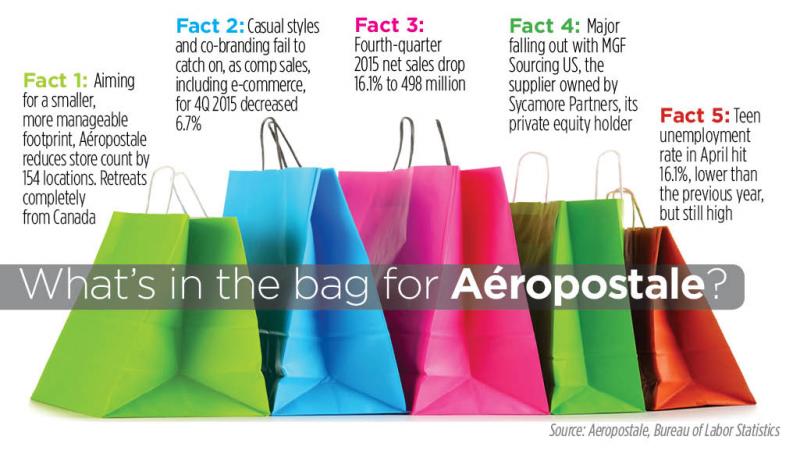Teen apparel retailer Aeropostale is the latest chain to fall victim to the rapidly changing marketplace.
The 1990s and turn of the Millennium were Aéropostale’s heyday. Its casual, logo-covered fashions seemed to be teen must-haves, and it ended 2010 with $2.4 billion in net sales, an 8.0 percent increase over the previous year. Even after the recession, Aéropostale was still a ubiquitous presence in malls across the country.
The retailing environment has shifted dramatically since then, and Aéropostale has felt the impact of those changes. Now, the former mall A-list tenant has been delisted from the New York Stock Exchange, and has filed for Chapter 11 protection, putting it in much less prestigious company.
Aéropostale officials said they plans to close 113 of the chain’s U.S. stores and all of its 41 stores in Canada as part of the reorganization plans. The retailer wants to emerge as a stand-alone enterprise with a smaller footprint. The question for mall landlords and investors is whether Aéropostale can really succeed.
Of its 739 remaining stores, many are located in class-B malls, according to Howard Davidowitz, chairman of Davidowitz & Associates Inc., a retail consulting and investment banking firm headquartered in New York. Even after the retailer closes the weakest performers, landlords will still be challenged to find replacements for them, since Aéropostale is a member of a struggling retail group. Its teen customers simply do not have the spare cash to spend, no matter how thoughtfully its clothes are branded and marketed, Davidowitz says. Indeed, teen unemployment stood at 16 percent in April, according to the Bureau of Labor Statistics.
“The apparel business is wrecked,” Davidowitz notes. “Almost everyone in the sector is doing poorly.”
Aéropostale joins a growing list of retailers who have filed for Chapter 11 protection in recent months, including Pacific Sunwear and Sports Authority.
A remedy as effective as ripped jeans
Aéropostale has been attempting to revive its business since 2010. To that end, the company devised a comeback centered around the mainstream tastes of its core customers.
It offered the lifestyle concept Live Love Dream, which sold active wear and swimsuits, a clothing line based around the popular teen drama series “Pretty Little Liars,” and another range of garments, inspired by Bethany Mota, an ebullient brunette with a devoted YouTube following.
Operationally, the company closed stores in an effort to reduce its footprint, and turn over its inventory faster.
Yet analysts had mixed responses to the chain’s efforts at revitalization. In 2013, Trefis, a research firm headquartered in Boston, noted that the merchandise was too basic, did not have enough fashion offerings and the retailer’s sales strategy relied too heavily on discounted basic clothes.
About a year later, in May 2014, Aéropostale announced that it had sold a major stake in the company to Sycamore Partners, a New York-based private equity firm, and accepted a $150 million loan from the company. The partnership required that Aéropostale take on a new supply chain agreement with MGF Sourcing US, an apparel manufacturing and supply chain management firm owned by Sycamore.
The agreement did not make the impression Aéropostale had hoped for. Morningstar analysts expressed concern about market share losses and financial troubles at the company. In a note published in June 2014, Bridget Weishaar, then a stock analyst at Chicago-based Morningstar, saw many of the changes as positive. But operational and financial concerns lingered.
“We think the firm lacks pricing power and customer retention and has no sustainable competitive advantage, making performance volatile under the best circumstances,” Weishaar wrote.
As for the agreement with Sycamore, it crumbled into open rancor, fueled by a financial dispute with MGF. In its bankruptcy filing, Aéropostale claimed that MGF demanded new payment terms not authorized under its agreement with Sycamore and that MGF threatened not to ship goods to the retailer unless it complied. Now, Aéropostale is operating with $160 million in DIP financing from Crystal Financial LLC.
When Aéropostale wound down its logo business in 2015, the decision turned out to be symbolic. The name Aéropostale had lost its favor with shoppers after 2015 net sales amounted to $1.5 billion, a decrease of 18 percent. In April, the stock was de-listed from the New York Stock Exchange.
Aéropostale is still hoping to regain its former glory and attain long-term success, but that might prove to be elusive if teenagers simply have limited cash.


